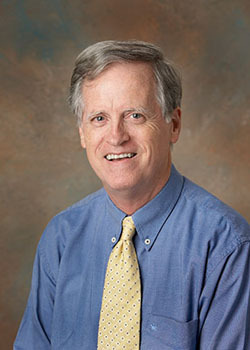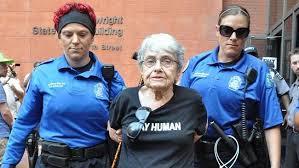Every teacher has heard the snide comment, "those who can, do; those who can't, teach." Whatever the origin of that ungenerous comment (probably the sour grapes of a nonperforming student), there is no teacher more capable of refuting that specious proposition than Professor Edward M. Gaffney of the Valparaiso University law school.
I first met Ed in 1980 when I interviewed for a faculty position at the Notre Dame Law School where Ed was then teaching. In the course of that short interview, Professor Gaffney disclosed an abiding commitment and energy for the defense of the human rights of the defenseless that has been an inspiration to me ever since. Ed Gaffney not only can defend those without defenders, even in the face of formidable opposition, but he has regularly done so through formal legal argument in federal and state courts, scholarly books, and powerful documentaries, such as Empty Boxcars, a prize-winning documentary about the Shoah in Bulgaria and its occupied territories.
I can usually count on hearing from Professor Gaffney when somewhere in the world human injustice needs to addressed and corrected. Given the violent deaths in Ferguson, Missouri, the long march of ISIS brutality in Iraq, and death being unleashed by Israel and Hamas against civilians, Professor Gaffney has been busy assisting the cause of justice. What is remarkable about his current work is that it brings these seeming disparate events into singular focus through the extraordinary life of Hedy Epstein, who as a survivor of the Nazi pogrom has a distinctive voice; a voice that has not been bashful about challenging human rights violations on all sides, including that of the indiscriminate killing in the Gaza.
In the course of his documentary work, Professor Gaffney met and learned the moving account of Hedy Epstein's survival of the Holocaust in an extraordinary program, "Kindertransport" which, as Professor Gaffney details below, involved the rescue of young Jewish children by moving them to the U.K. where they were welcomed with great kindness by "amazingly hospitable parents. Hedy's story is more than a statement of courage; it is one of perseverance and faith in the basic goodness of the human person, a faith that has manifested itself through a lifetime of defending those who are terrorized and oppressed by those delegated authority to preserve and protect human life, but instead pursue exactly the opposite. As Professor Gaffney reveals, Hedy Epstein at an age(90) when many citizens can barely make it through the day without considerable assistance is engaged in peaceful protest refusing to be a "bystander" in the face of injustice.
Living in Missouri not far from Ferguson,, Hedy's heart could not remain silent and she was arrested for her nonviolent protest.
The arrest for constitutionally protected speech is to say the least questionable. The greater injustice, which prompted Professor Gaffney to swing into action and pen the following thoughts was not just the legally dubious arrest of this profile in courage, but the temerity of a journalism fellow to diminish Hedy as just a publicity seeker whose horrifying experience of being separated from her family apparently is to this writer insufficient and can be derisively labeled "fake."
As Professor Gaffney records, there is nothing "fake" about the little girl named Hedy Epstein experienced. The horror of being separated from your parents at that tender age is hardly fakery even if Hedy was one of the fortunate ones not to be gassed in the camps -- as her father and mother were. Saved by the kindness of strangers, Hedy has devoted the balance of her life to manifesting a like kindness, and herewith Professor Gaffney's thoughtful rebuttal of those who seek to diminish Hedy's courage and commitment to justice.
After summarizing news accounts that troubling confirm the need for the independent inquiry into the police shooting of Michael Brown, Professor Gaffney writes of the "swiftly moving events this week that have brought the two stories of Michael Brown and Hedy Epstein closer together. On Monday, August 18, Alana Horowitz reported in The Huffington Post that Epstein -- renowned for translating her personal convictions into direct nonviolent action -- was arrested for refusal to disperse from a public demonstration protesting Governor Jay Nixon's decision to order the National Guard into Ferguson and to impose a curfew on nonviolent, peaceful demonstrators in that troubled community.
The day after the arrest of Epstein and seven others, Daniel Greenfield, a Shillman Journalism Fellow at the David Horowitz Freedom Center, exercised his freedom of speech and press by publishing his view on the Center's "Frontpage Magazine" that Epstein is a "fake Holocaust survivor who attacks Jews."
Greenfield's attack on Epstein is misinformed on small points such as where Epstein was arrested (on a public sidewalk in downtown St. Louis in front of the State Building) and the small distance between Epstein's home and Ferguson. But inattentiveness to details such as these betrays a much more fundamental inattentiveness to the history of the Shoah, which he badly misstates when he attacks Epstein as a "fake Holocaust survivor."
Dr. Michael Berenbaum -- founding Director of Content at the U.S. Holocaust Memorial Museum, then executive director of the Spielberg Foundation, and now distinguished professor at the University of Judaism in Los Angeles -- notes: "The overwhelming consensus among all serious historians of the Shoah is that anyone who lived through the period of Nazi persecution of Jews in Germany is a survivor of those gross violations of human dignity, including massive theft and dispossession, life-altering loss of liberty, and arbitrary arrest and confinement in concentration camps where hundreds of thousands were murdered by starvation or overworking. To restrict the definition of a survivor to the handful who escaped from a death camp in Poland or who were lucky enough to live until the Allies liberated the notorious concentration camps throughout Nazi-occupied Europe badly understates the brutality and cruelty of the Nazis towards all their victims. And it overlooks the glorious record of non-Jews who rescued Jews throughout Europe by hiding them from their oppressors."
Anyone, including Greenfield, who wishes to become more informed about the complexity of the famous Kindertransport program, should either see the Academy-award winning documentary film "Into the Arms of Strangers: Stories of the Kindertransport (written and directed by Mark Harris and produced by Deborah Oppenheimer), or read the companion book. Both the movie and the book describe the full horror of life for all Jews who lived through the experience of Nazi persecution from 1933 to 1945. They focus, for example, on the terrifying moment of the "November 1938 Kristallnacht" or "Night of Broken Glass" And they contain specific details about Epstein's experience in these terrible years that make Greenfield's attack on her a curious form of Holocaust denial.
We return to the happy occasion of Hedy Epstein's 90th birthday. Anyone who wants to get to know Hedy a little better should watch "Valiant Woman," a short (12 minute) video (being uploaded on You Tube) made to honor Hedy on her recent birthday. With scenes from "Into the Arms of Strangers," this short film highlights key events in Hedy's amazing life that eventually led her last Monday to "refuse to be a bystander" when events defining the quality of our life together in this republic are happening in her own back yard.
In short, the Kindertransport was a program that rescued 10,000 young Jewish boys and girls from being murdered solely because they were Jews. Rather than describing these survivors as "fakes," we should admire the amazing courage of Jewish parents willing to entrust their own flesh and blood to amazingly hospitable parents in the UK willing to offer their children the safety of their homes. We should recall, moreover, that England was a war zone; its cities were not beyond the reach of the German Luftwafte, which regularly bombed civilian targets during the Blitz. Even so, getting these children to England gave them a much greater chance at survival than seemed possible for Jews in "Greater Germany" in 1939. By that time "Germany" included all of Austria and Czechoslovakia. In the same year, it is worth noting, our Congress turned down a modest plan to offer similar asylum to Jewish children within our own neutral and safer borders.
In "Valiant Woman" Hedy describes on camera the unforgettable moment of separation from her parents at the railway station in August of 1939 when she had the last glimpse of her parents Ella and Hugo Wachenheimer. As the train pulls away, she sees the flood of tears flowing down their cheeks and realizes how much her mother and father loved her to be able to let go of her at that moment, so that she would survive the fullest horror of Nazi Germany and the imminent war that began within weeks of this wrenching event.
Cut off from her family throughout the war, in July of 1945 Hedy returned to Germany to work for the United States Government. She served under General Telford Taylor as an analyst and translator for the American prosecutors who made the legal case for the guilt of the infamous Nazi doctors tried in Nuremberg in 1946 and 1947.
After the war Hedy learned that shortly after she was separated from her parents, the Nazis deported them from Germany to France. And she learned that when the time came for the "final solution" to the "Jewish Question" in 1942 and 1943, French officials became willing collaborators with the Nazis and deported Hedy's parents on French trains to Auschwitz, where they were murdered upon arrival. Hedy also learned that all of her relatives were murdered in a Nazi killing center in occupied Poland. She alone survived the Shoah in her family.
Who are we to call anyone pained by such atrocities a "Holocaust fake"? It is grossly unjust -- even worse, it is uncompassionate -- to denigrate or trivialize such experiences.
When we have walked a mile in Hedy Epstein's shoes, we might be in a position to engage her respectfully as one with whom we might disagree on this or that point of fact or of morality or of law, in Ferguson or Gaza. If one were to do that, we would find in her an attentive listener and a superb partner in dialogue, even about highly controversial matters. Until we are willing to do that, it is churlish, even shameful, to attack this calmly strong and valiant woman, this disquieting and disturbing woman, with cheap shots at her experience as a Holocaust survivor."
Professor Gaffney has said all that needs saying; let us be thankful that there are teachers -- Hedy Epstein and Ed Gaffney -- who teach us about the best of humanity by witnessing it by their own lives.


